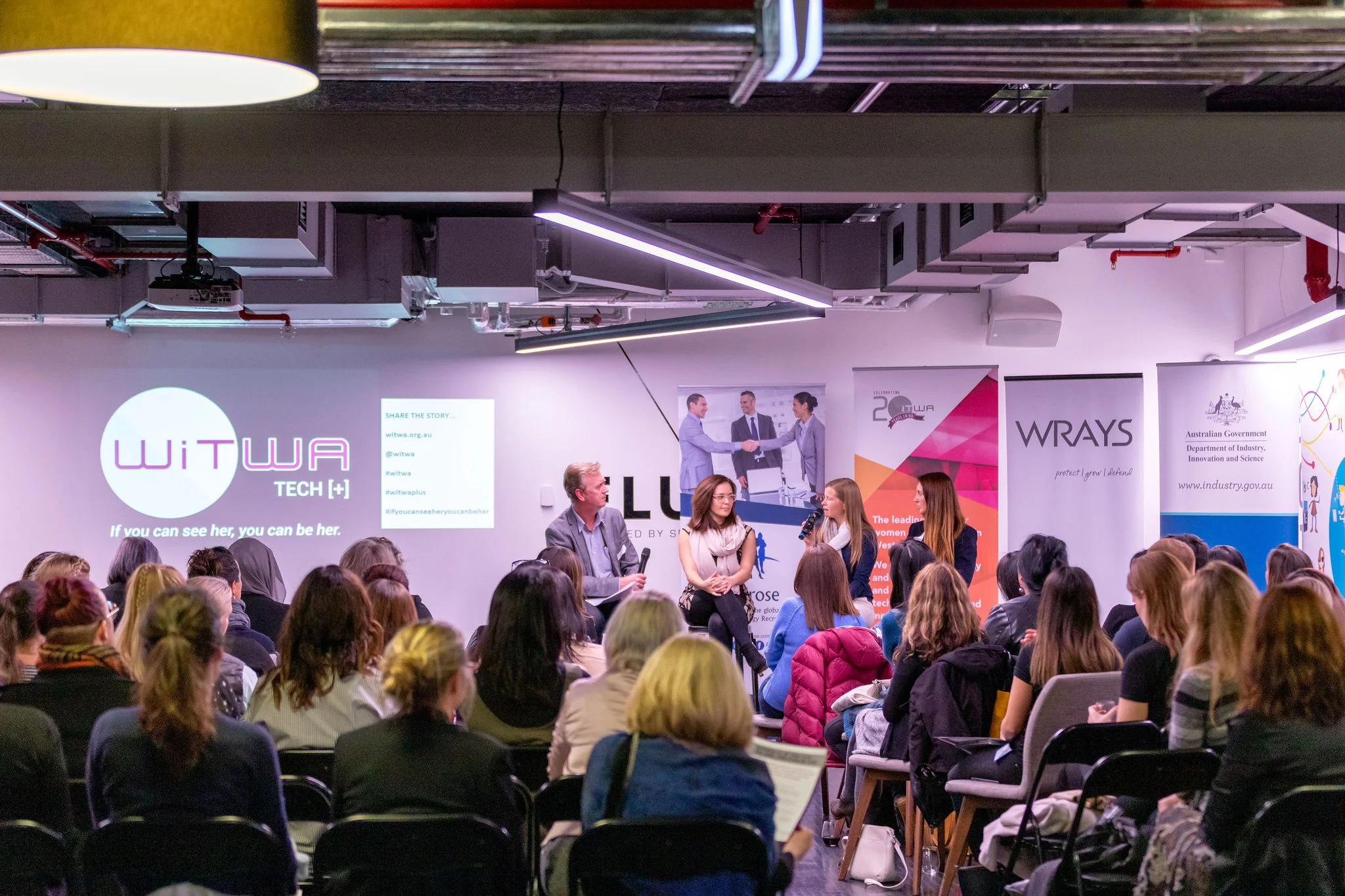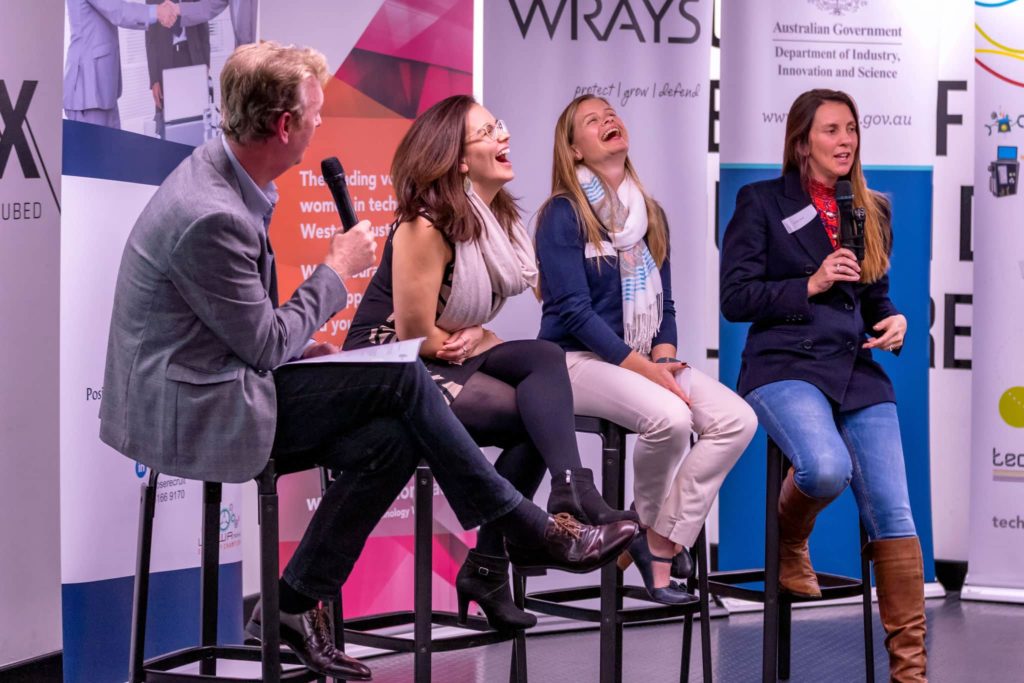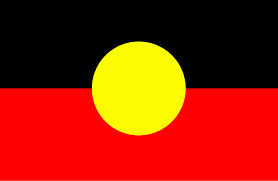Insightful. Engaging. Entertaining.
With an interesting panel comprising of panel host for the evening Charlie Gunningham (co-host of Startup West Podcast) and three panel members – Beth Caniglia (Global Marketing Manager at VROC AI), Dr Sofie De Meyer (CEO of MALDIID) and Louise Daw (co-founder of MiPlan) – it was a fascinating evening delving into the broad and collective experience of each start-up journey.
Our event sponsor WRAYS, kicked off proceedings to a sold-out event with Rebecca Hembling, Head of Marketing and Business Development at WRAYS, revealing a sobering statistic about women in the STEM arena.

Only 16% of STEM graduates are female and only 27% of the STEM workforce are female!
Yet promisingly, all members on the panel described the WA start-up scene in a positive light. There is a lot of activity and a huge support network at our fingertips with a high value placed on having an industry mentor to bounce ideas off. All agreed that for WA there is an urgent need for more venture capital and investors. Comparisons were drawn between the difference in the mindset between Australian and U.S. VC’s and investors. By way of example, failing as a start-up was seen as a strength in the U.S. in comparison to a failed start-up on Australian shores.
Where do good ideas come from?
Sofie De Meyer’s passion as a researcher is problem solving, with her ideas stemming from trying to resolve “real world” problems. Transitioning from university researcher to business person was a very different experience for her. She had no prior business background and experienced a huge learning curve when she first joined the start-up scene.
“There is a great network here in Perth WA”
Sofie refers here to the availability of a wide network of workshops, organisations, accelerators and incubators in the WA start-up scene. “I think I’ve almost done just about all of the workshops on offer that you can do.”
Following eight years in Australia, Sofie reflects that the networks here in WA are a great way to learn business lingo, as well as tips to gain traction within the start-up scene. Since then, Sofie has participated in the Curtin Ignition Program, CERI Program and Harvest Accelerator program. Impressively she was also a winner of the WA Innovator of the Year Award.
Louise Daw cited that her ideas stemmed from her general frustrations with the limited options available to capture data out in the field and wanting processes to work more efficiently. Louise and her business partner applied for several awards over the years, including the Business News Rising Star and a Commercialisation Australia grant. They were unsuccessful in their attempts. However, in 2017 Louise was awarded the West Australian Entrepreneur of the Year by EY.
Pitching
When pitching a start-up idea, Beth Caniglia emphasised the importance of having a good business plan in place capable of solving an actual problem. If you get that right, then you increase the chance of the business being worthy of recognition and have the ability to attract paying customers.
When questioned about the age old elephant in the room – gender bias when pitching to male investors – overall , the panel was split. Louise’s style is to remain gender neutral and to tune into levels of interest and investor engagement. When answering tricky questions, Louise’s tip is to reframe the question in her mind before answering but to ensure she is confident in her knowledge and numbers behind the business idea.
Beth referenced a TEDx talk by a researcher in the area of gender biased questions. According to the research, questions tended to be framed in a more defensive manner toward women (i.e. What will you do if something goes wrong?) as opposed to male counterparts getting asked positive questions along the lines of ‘What does the future look like?’. She supported Louise’s answer of reframing the final answer and felt that this was a good way around this issue.
Ready, Set, Launch…
The first time Louise and her business partner launched, they sold the idea of their product to existing customers before going away to build the actual product. Building took three months. However, after that experience MiPlan decided ‘never again’ and worked at building the product first, having it proven to a few clients. This in turn helped to build product credibility.
Sofie advised having a strong solid market research base to work from was important and how imperative it is to understand the size of the market.
Beth’s past experience included helping her previous start-up employers to build the technology/product. She underlined how having a road map was so vital when first starting to get your business off the ground – you know where you’re going and how you plan to get there.
Why apply for awards?
It was timely to have the panel members discuss awards they’d won and how they felt winning an award was beneficial in the long term. Especially with the launch of the WITWA 2019 Tech [+] 20 Awards on the same night!
Beth confirmed that having Jennifer Reyes, of VROC, win WA Innovator of the Year in 2015 was quite critical in building credibility and solidifying the product on offer. Especially as it was a time where VROC was taking clients on board. Winning an award was an external validation from within the industry.
As Sofie couldn’t tap into any existing networks, moving to Australia only 8 years ago, she sees winning awards as a way to generate recognition and belief in the work you’re doing. Winning an award is a strategic move in getting investors on board and attracting staff to working towards the end goal.
Louise figures forewarned is forearmed; while she made it clear that the award application process is arduous, the plus side of winning is definitely a strong addition to one’s business profile within the market.
Top Tips on Winning Awards
WiTWA was lucky enough have Anne Furey, Principal Consultant with Grant Smart treat our audience to her valuable industry knowledge on awards and the pro’s and con’s. While Anne reflected Louise’s sentiments in that award applications are time consuming and do not always attract cash offerings, the benefits were plentiful.
- The application process can help you with road mapping where you are going with your idea;
- Lifts your profile if a winner or finalist on the award website. You can use the logo on your own website and promotional material;
- Think about what you want to achieve. There are some awards that industry-specific and some that are not.
- Look to both local and state government awards. Some awards could then move onto national awards and events.
Anne’s application tips include:
- Make it easy for the award judges. Ensure you make your application interesting, but don’t make the mistake of relying on any attachments.
- Answer the questions asked. Explain your answers clearly.
- Point to evidence to support your claims. Remember: this is not a marketing pitch!
Anne suggests having an independent review of your application, so that an external critique can be provided outside of your team.
Leap forth boldly!
WITWA encourages you to either nominate a worthy applicant or even yourself for the WITWA 2019 Tech [+] 20 Awards.
Lacey Filipich takes every opportunity to remind us of the female role models surrounding us. Enticing those in attendance to realise that if we can get more women into STEM careers, we are giving 14-year-old girls the chance to #ifyoucanseeheryoucanbeher by nominating at least two women who are working within the STEM space. Using her infectious smile and vivacious presence, her mission should you accept it, is to find at least two women to nominate – if you can’t, you aren’t trying hard enough!
Lacey also gave a shout out about the upcoming WITWA [+] 2019 inaugural conference. Tickets are now on sale! Visit the website at https://events.humanitix.com.au/witwa-2019-conference and secure your early bird tickets for a limited time only!
Veronica Ennor, WITWA member 2019


